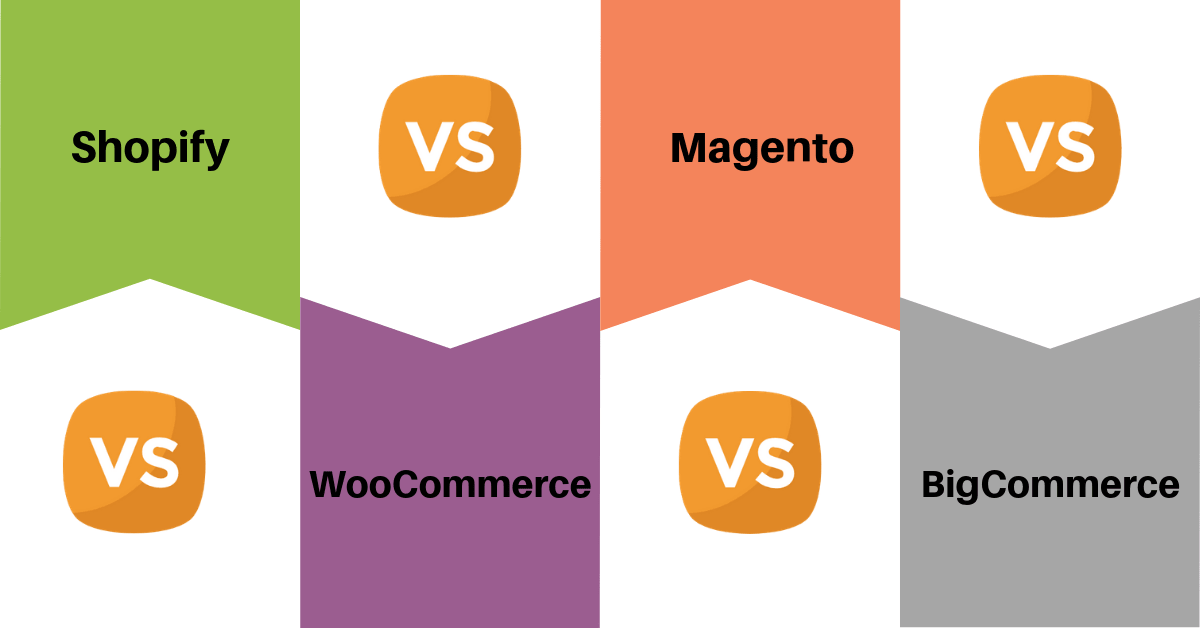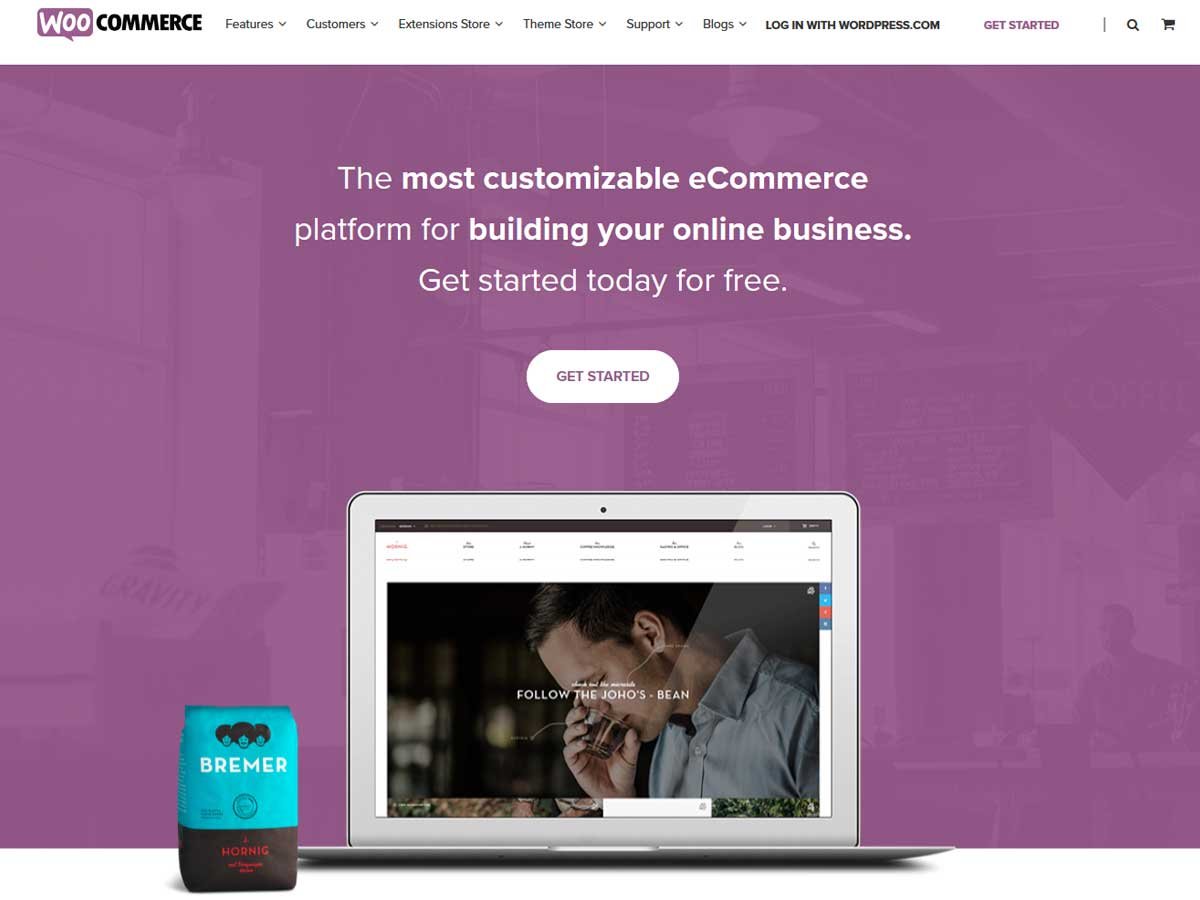Shopify vs WooCommerce vs Magento vs Bigcommerce – Which one is the best e-commerce platform?

Wondering: Shopify vs. WooCommerce vs. Magento (currently known as Adobe Commerce) vs. Bigcommerce: Which one is the best e-commerce platform?
In 2024 alone, Revenue of e-commerce market is projected to reach $3.5 billion dollars. E-commerce’s big time players like Shopify, WooCommerce, Magneto (Adobe Commerce) and Bigcommerce are fiercely competing with each other to establish their reign. All of them are widely used e-commerce platform however there’s some big difference in their work. To begin with, the quick overview of each of the e-commerce platform then after continue with details.
Overview of Shopify vs WooCommerce vs Magento vs Bigcommerce
| E-Commerce Platform | Price | Ease of Use | Active Users | In-Built Marketing | Rating | Visit Site |
 | Start from $25 | 9/10 | 500,000+ | Yes | 9/10 | Shopify |
 | Free | 8/10 | 2,000,000+ | Yes | 8/10 | WooCommerce |
 | Free and Premium | 7/10 | 250,000+ | Yes | 7/10 | Adobe Commerce |
 | Start from $29/m | 10/10 | 50,000+ | Yes | 10/10 | BigCommerce |
Here we go for the details of each e-commerce platform and compare Shopify vs. WooCommerce vs. Magento vs. Bigcommerce on the basis of:
- Key Features
- Pros and Cons
- Ease of Use
- Price and Cost
- Security and Support
- SEO
- ECommerce Design and Templates
Let’s get started.
Shopify:
 Key Features:
Key Features:
- Unlimited Products
- Web-based website builder
- 100+ professional themes
- Free SSL Certificate
- Automatic carrier shipping rates
- Mobile Commerce-Ready
Pros:
- It is very easy to use and navigate for beginners.
- With the help of SEO and social media options, it’s getting easier for promotion.
- It comes with free hosting and SSL.
Cons:
- There are limited default product attributes.
- It is only available in the paid version and the URL structure is also not ideal for SEO.
Ease of Use:
- It is a fully hosted platform based on an online tool that has a basic set-up.
- The Shopify app provides easy accessibility.
- It has lots of visual cues, reliable typography, and simple language.
Price & Cost:
- Build an online store on Shopify for just $25/month for the basic plan that provides unlimited file storage, discount code creation, and much more.
- Also, it includes hosting and a shared SSL certificate.
- To access more advanced features, you need to pay a bit more per month.
Security & Support:
- Shopify is secure and fast, to keep your site secure and fast loading it invests lots of time on infrastructure, security, and maintenance.
- It provides 24/7 customer support services even it allows support on the phone, email and web chat.
SEO:
- It is quite SEO-friendly and has features right out of the box, but there’s so much more you can do to climb up in the rankings.
- Use SSL (Secure Sockets Layer) encryption, builds the secure links between a web server and a browser.
ECommerce Design & Templates:
- The themes of Shopify have great visual quality, have unique variations and designs, and have more than 100 different templates (both free and paid).
- Customization is allowed, which means you can change the theme easily and adjust the colors and styles.
- It’s even better that you can edit within the theme editor of Shopify.
WooCommerce:
 Key Features:
Key Features:
- WordPress Content Integration
- Reduce Page Loading
- Modern and Clean Interface
- Multiple Shipping Methods
- It comes with a REST API
- Unlimited images and galleries
- Mobile-friendly structure
Pros:
- WooCommerce is among the most popular WordPress plugins. Simply download it and add the required products from the WordPress dashboard.
- It is open-source software that is free for editing and customization.
- It supports multiple payment options: PayPal, major credit cards, bank transfers, and cash on delivery.
Cons:
- Sometimes the WooCommerce WordPress updates create issues.
- Customization can be costly.
- Requires the knowledge to use effectively.
- Hosting is not free; you have to pay for it.
Ease of Use:
- It is not a hosted platform, which means you need to self-install, manage, keep backups, and look out for security.
- Customization options make it super easy to add any functionality to your website.
- Due to the absence of a built-in drag-and-drop design builder, you need to use the WordPress page builder.
Price and Cost:
- Although it is freely available to run a WooCommerce store, you need a domain name, WordPress hosting, and an SSL certificate.
- Technically, WooCommerce is cheaper, but the additional extensions add up to your costs.
Security and Support:
- WooCommerce provides SSL, which provides strong security along with dedicated patches to fix any vulnerabilities, with various updates available.
- They have only provided forum support, where you have to drop the problems and wait for the answers.
SEO:
- WooCommerce integrates with WordPress so there is a plus point in terms of SEO.
- It has its own SEO functionalities that help it climb up the rankings.
Ecommerce Design and Templates:
- They provide the limitless customization that you can make the design on your own concept.
- It comes with a ton of templates, which makes your website design attractive.
Magento (Adobe Commerce)

Magneto, currently known as Adobe Commerce, is one of the biggest and reasonably best e-commerce platforms in today’s tech world. Adobe, being the best in the photo and video industry, has been competing in e-commerce by creating and managing a platform known as Magneto. Now that they have changed to Adobe Commerce, they are getting much more praise and good reviews.
- Free Shipping Functionality
- Responsive Design with 700+ Themes
- Unlimited Product Attributes
- Various Payment Options
- Inventory Management
- Newsletter Subscription Management
- Integration with Google Analytics
Pros:
- It is a feature-rich eCommerce platform that manages multiple storefronts with multi-language and multi-currency support.
- The community version is free and has large community of users who have developed many plugins and extensions.
- Allow you to customize the themes as you want and to develop functionality.
Cons:
- It is an intensely large system so good Magento developers are tough to find.
- It is only hosted on dedicated servers due to the size of the system. Shared hosting creates a slow and annoying user experience.
- Due to its flexible architecture, it takes more time to set up and customize.
Ease of Use:
- To work on with Magento, you should have great experience in web development.
- It has a fast and simple self-hosting setup.
- For advanced users, lots of things are offered to build a larger online store.
Price and Cost:
- The community edition of Magento is free; however, it requires technical setup, which adds costs.
- The enterprise edition starts at $18,000 a year and we also need to provide the hosting.
Security & Support:
- In terms of support, they have their own big community where their own developers and user community provides the supports.
- Magento is a secure platform where online transactions and user data is involved.
SEO:
- Easily implement the on page strategies and edit the meta content.
- Solve the issues by facilitating better optimization of the e-commerce site.
Ecommerce Design & Templates:
- The theme of Magento comes with customizable however sometimes expert developers are required.
- It is a very classic-style e-commerce store that provides robustness in the menu bars and navigation.
Bigcommerce:
Key Features:
- Bulk-import and export products
- Inventory Management
- Multi-Currency Support
- Reporting & Analytics
- Automatic image compression
- Restful API
- Marketing tools
- Mobile-optimized store
Pros:
- BigCommerce comes with an all-in-one solution, which will be great for business starters.
- They offer all of their plans unlimitedly, including bandwidth, products, and storage space.
- You allow selling on multiple channels, such as Facebook, Amazon, Pinterest, Google Shopping, and much more.
- Facility to edit the downloaded theme files offline.
Cons:
- Some of their themes are quite expensive and they provide fewer free themes.
- It does not offer a free plan and sometimes it shows issues during customization.
Ease of Use:
- BigCommerce is a user-friendly solution that comes with an easy setup to create a store website.
- It handles your store, orders, adds products, and so on, which makes the execution of the task easy and simple.
- It is easy to create a discount and coupon code that will be able to be set up for whole orders or a specific one.
Price & Cost:
- It is a paid solution and comes with three pricing plans, and they are:
- Standard: $29/month,
- Plus– $79/month,
- Pro: $299/month.
Security & Support:
- They provided 24/7 live agent support.
- They have an online video series that covers all the questions of the customers.
SEO:
- It automatically optimized the titles, URLs, sitemaps, and more for your pages.
- Provided the SEO box on each of the pages for adding information manually.
- They offer more built-in SEO features, including Facebook Open Graph, Canonical Tag, 301 Redirects, and much more.
Ecommerce Design and Templates:
- Both free and paid templates from BigCommerce include visually stunning designs that fit major industries.
- With the help of these tools, you can create a fully customized and responsive website to streamline your online business.
Wrapping Up
To sum it all up, in my perspective, all of them are the best solution, depending on what you are looking for. Let us know, which one is the best e-commerce platform in the comment box.
I hope this article helped you choose the right platform and for more informative articles, don’t forget to share and follow us on Twitter and Facebook.
Also, I would like to share some of the other informative articles here:



Help! Please. I am opening a used books online store. Which is the best e-commerce platform for me with books ? Thank you
You can use an easy digital download plugin to start the digital store. You can also use woocomerce to sell the digital ebooks online 🙂